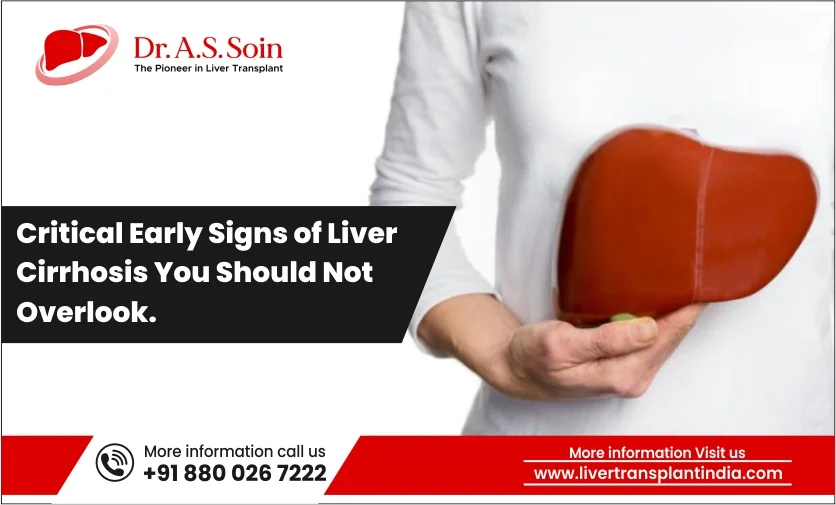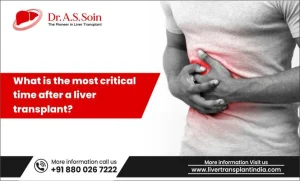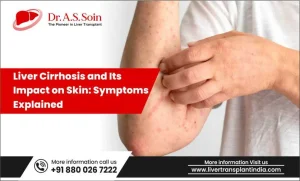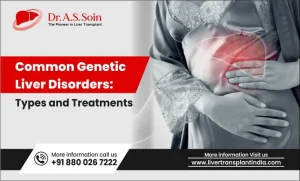The liver is a powerhouse organ that helps us stay healthy by filtering toxins, aiding in digestion, storing nutrients, and performing hundreds of vital functions. However, when the liver is damaged over time, it can develop a serious condition called cirrhosis. Cirrhosis happens when healthy liver tissue is gradually replaced by scar tissue, which eventually hinders the liver’s ability to function properly. This damage is often irreversible, making it essential to recognize early warning signs and seek medical help as soon as possible. By catching liver cirrhosis in its early stages, you might be able to prevent more serious health complications and even slow the progression of the disease.
Here, we’ll explore some critical early signs of liver cirrhosis that you shouldn’t overlook. Paying attention to these symptoms can help you seek prompt medical intervention and preserve your health.
Table of Contents
Toggle1. Unexplained Fatigue and Weakness
Feeling constantly tired and low on energy is a common early sign of liver cirrhosis. While it’s normal to feel tired after a long day or a stressful period, chronic fatigue that doesn’t improve with rest could be a red flag. As liver function declines, the body can’t filter toxins effectively, which can lead to persistent fatigue and weakness. If you feel excessively tired without a clear reason, it may be time to consult a healthcare provider.
2. Loss of Appetite and Sudden Weight Loss
Another common early symptom of liver cirrhosis is a loss of appetite. This lack of hunger may lead to unintentional weight loss, as you eat less than usual. As the liver becomes damaged, it struggles to produce bile, which is essential for digesting fats. This can lead to digestive issues that contribute to a loss of appetite. If you notice that you’re losing weight without trying or feel less hungry than usual, consider checking in with a doctor, as this could be a sign of liver problems.
3. Nausea and Vomiting
When the liver is damaged, toxins can accumulate in the blood. This buildup of toxins may cause nausea, vomiting, or an upset stomach. These symptoms are often mistaken for common digestive issues, but if they become frequent, they shouldn’t be ignored. Nausea and vomiting that last for days or weeks might be an indication that your liver isn’t functioning properly.
4. Swelling in the Abdomen (Ascites)
One of the hallmark signs of advanced liver cirrhosis is ascites, which is a buildup of fluid in the abdomen. However, mild swelling can appear in the early stages of cirrhosis as well. This swelling occurs because the liver struggles to produce proteins like albumin, which helps maintain fluid balance. As a result, fluid can accumulate in the abdomen, causing discomfort and a bloated feeling. If you notice that your abdomen seems more swollen or feels unusually full, it’s wise to seek medical advice.
5. Jaundice (Yellowing of Skin and Eyes)
Jaundice is a well-known symptom of liver issues and is caused by the buildup of bilirubin, a yellow pigment, in the blood. When the liver is unable to process and eliminate bilirubin properly, it begins to accumulate, leading to a yellowing of the skin and eyes. Jaundice is a clear sign that the liver isn’t functioning as it should and needs immediate medical attention.
6. Easy Bruising and Bleeding
If you start noticing that you bruise easily or experience bleeding that’s more frequent or harder to stop, this may be a sign of liver dysfunction. The liver is responsible for producing proteins that help blood clot, so when liver function is impaired, you may notice more frequent bruising or prolonged bleeding. This symptom might initially seem unrelated to liver health, but it shouldn’t be ignored.
7. Spider Angiomas (Tiny Blood Vessels Visible on the Skin)
Spider angiomas are small, web-like clusters of blood vessels that appear near the surface of the skin, typically on the face, chest, or arms. They are common in people with liver cirrhosis, particularly due to hormonal imbalances associated with liver damage. If you notice the appearance of these small blood vessels on your skin, it might be worth consulting a healthcare professional, as it could signal liver issues.
8. Changes in Urine Color and Stool
Dark urine and pale or clay-colored stool can also indicate liver problems. When the liver isn’t working properly, bilirubin levels in the blood can increase, leading to dark-colored urine. Likewise, bile production might decrease, causing stools to become lighter in color. These color changes could be one of the earliest visible signs of liver damage, so if you notice persistent changes, it’s a good idea to talk to a doctor.
9. Redness in Palms (Palmar Erythema)
Red palms, or palmar erythema, is another early sign of liver cirrhosis. This redness, often accompanied by warmth in the palms, occurs due to hormonal changes linked to liver dysfunction. It’s a lesser-known symptom but can be an early indication of cirrhosis. If you notice this kind of redness on your palms and it doesn’t go away, consider discussing it with a healthcare provider.
10. Mental Confusion and Memory Problems (Hepatic Encephalopathy)
As the liver becomes less effective at removing toxins, these toxins can build up and affect brain function, a condition known as hepatic encephalopathy. Early symptoms might include forgetfulness, difficulty concentrating, or mild confusion. While these symptoms are often associated with other conditions, if you’re experiencing unexplained memory issues or mental fog, it could be linked to liver problems.
11. Swelling in Legs and Ankles
Apart from abdominal swelling, cirrhosis can cause fluid to accumulate in the legs and ankles, leading to noticeable swelling. This condition, known as edema, happens because the liver struggles to regulate proteins and blood flow, which allows fluid to leak into tissues. If you notice unusual swelling in your legs or ankles, especially if it persists, it might indicate liver issues.
12. Frequent Itching of the Skin (Pruritus)
Persistent itching without a clear cause, known as pruritus, can be an early sign of liver cirrhosis. This itching may be due to bile salts building up in the skin as liver function declines. While itching can result from various factors, if it’s chronic or worsens over time, it could be worth getting your liver health checked.
13. Hormonal Imbalances
For both men and women, cirrhosis can lead to hormonal imbalances. In men, this can cause symptoms like breast tissue enlargement (gynecomastia), loss of body hair, or testicular shrinkage. Women may experience irregular menstrual cycles or early menopause. These changes occur because the liver plays a role in regulating hormones. If you notice unusual hormonal changes, it could indicate liver problems.
14. Sleep Disturbances
Many people with liver cirrhosis experience changes in sleep patterns. This might mean feeling overly sleepy during the day and struggling with insomnia at night. Liver dysfunction can disrupt the body’s sleep-wake cycle, leading to fatigue and restlessness. Sleep issues are common, but if they become chronic without a clear cause, consider discussing liver health with your doctor.
15. Frequent Infections
A weakened liver can impair the immune system, making you more prone to infections. If you notice that you’re getting infections more frequently than usual, it might be linked to liver problems. A healthy liver supports the immune system, and when it’s not working well, you may find yourself dealing with more frequent illnesses.
What to Do If You Notice These Symptoms
Recognizing the early signs of liver cirrhosis is the first step to protecting your liver health. If you notice any of these symptoms, consult a healthcare professional for a thorough evaluation. They may recommend blood tests, imaging studies, or even a liver biopsy to diagnose liver issues.
Liver cirrhosis is often irreversible, but early intervention can make a big difference in managing symptoms and slowing disease progression. Treatment may involve lifestyle changes, medications, or in severe cases, a liver transplant. Early diagnosis and treatment are crucial to maintaining quality of life and reducing complications.
Ways to Protect Your Liver Health
Preventing liver disease involves making healthy choices and avoiding behaviors that harm the liver. Here are some tips to protect your liver:
- Limit Alcohol Consumption: Excessive alcohol use is a major cause of cirrhosis. Drink in moderation, or avoid alcohol if you’re at risk of liver disease.
- Maintain a Healthy Diet: Eating a balanced diet with plenty of fruits, vegetables, lean proteins, and whole grains can support liver health.
- Exercise Regularly: Physical activity helps reduce the risk of fatty liver disease, which can lead to cirrhosis.
- Avoid Toxins: Reduce exposure to harmful chemicals, such as cleaning products and pesticides, which can harm the liver.
- Get Vaccinated: Vaccinations for hepatitis A and B can protect against viral infections that affect the liver.
- Use Medications Responsibly: Avoid unnecessary medications, and follow dosing instructions carefully to avoid straining your liver.
Conclusion
Liver cirrhosis is a serious condition that often develops over time due to chronic liver damage. Although cirrhosis can’t always be cured, recognizing early symptoms and seeking prompt medical care can make a big difference in slowing the disease’s progression and maintaining liver function.
If you or a loved one are experiencing any of these early warning signs, consider discussing liver health with a medical professional. By staying informed and proactive, you can help protect your liver and lead a healthier, fuller life.








